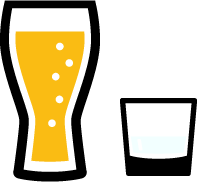There are 13 multiple choice questions coming.
Click an answer to choose that one.
have a go and see how much you REALLY know about alcohol!
Why does alcohol affect men and women differently?
- The liver breaks down alcohol more quickly in men than women
- Women’s bodies are generally smaller and have less body water, so alcohol concentrations rise more quickly
- Men’s stomachs are bigger so alcohol is absorbed more slowly
2
As women have less body water than men, alcohol levels in their blood stream rise more quickly when drinking the same amount. So, if a woman weighing 60kg drinks a double vodka then a man of the same size will need to drink a triple vodka in order to reach the same blood alcohol level.
Women also have less of the enzyme (ADH) which breaks down alcohol in the liver and in the lining of the stomach; so women break down alcohol more slowly.
Pregnant women are advised not to drink: why?
- Unborn babies get drunk very quickly
- Alcohol can harm an unborn baby in various ways
- Alcohol and the amniotic fluid don’t mix
2
Alcohol passes through the placenta directly to the fetus and so can harm the unborn baby . No safe level of drinking has been established for pregnant women, so the best advice is not to drink at all.
If someone drinks heavily when pregnant, then the risk of birth defects, both physical and mental increase significantly, this is called FASD or fetal alcohol spectrum disorder.
Those who drink too much all the time can become addicted to alcohol. Kicking the habit is exceptionally difficult. Why?
- Because alcoholics are very thirsty
- Because alcoholics drink out of habit
- Because alcoholics feel bad without alcohol
3
There is alcohol tolerance and alcohol addiction. Toleration is when someone gradually needs more and more alcohol to feel drunk. Addiction means that you can no longer do without alcohol. You feel you have to drink. Without alcohol you feel sick and start trembling, shivering or even have to vomit. That’s why it’s very difficult to get over addiction.
If you are worried about your own or someone else’s drinking, your school nurse or doctor can help you make the first steps or ring drinkline on 0800 917 8282 it’s a 24 hour confidential service.
When should adults avoid drinking any alcohol?
- If they’re operating machinery or working at a height
- If they’re over 40
- If they’re going to be a passenger in a car
1
For adults, drinking in moderation (one or two drinks) is usually a pleasant and relaxing thing to do and leads to no harm most of the time. But there are times when you shouldn’t drink and these include if you work with machinery or at heights, as even small amounts of alcohol affect coordination, concentration, reactions and judgement.
Other times not to drink include: when planning to drive, to use electrical equipment, when competing at sport, or taking medicines – or when pregnant. A legal drinking age of 18 exists as young peoples’ brains and livers are not fully formed so alcohol has more of an effect.
Here is an average half pint of lower strength beer and a shot of vodka. Which glass contains the most alcohol?

- The half pint of beer
- A shot of vodka
- Both contain the same amount of alcohol
3
A half pint of beer and a shot of spirits contains about the same amount of alcohol – one unit. A glass of wine averages 2 units.
How much alcohol is in a drink depends on the glass size and alcoholic strength, which varies by brand so check the back label. Beer can range from 0% to 8% alcohol by volume (ABV), wine varies from 7% – 14.5% and spirits are mainly 40%, (an average glass of spirits with mixer will be 13%). At home, drinks poured are often larger than standard drinks. Adults are advised not to drink more than 14 units a week.
Why don’t alcohol and driving mix?
- Because alcohol slows down your reactions and judgements
- Because you’ll get a fine, points or lose your licence
- Because you run the risk of smashing up your car or injuring someone
1
The alcohol you drink passes through the stomach into the blood-stream. From there, it flows around your brain and nervous system.
Alcohol slows down signals in the brain. This explains why drinking alcohol affects what you see, how you think and feel and how you move and react, which slows down with every drink. That’s why the Government has strict drink- drive limits.
It’s best to plan how to get home before going out – such as one person not drinking and driving others home, booking a taxi or knowing about buses home. Always look after each other and never be tempted to go home alone.
Of course, drinking and driving also increases the risk of fines, prison, injury to the driver and others, damage to the car and the potential loss of job and insurance. These are consequences that will have to be lived with forever.
What are the low risk drinking guidelines for adults in the UK?
- The same for men and women, 3 units
- 14 units a week for men and women
- As much as needed to quench your thirst
2
14 units a week for men and women – that’s about 7 pints or 7 glasses of wine spread over the week
Most of the alcohol you drink is broken down by the liver. How long does the liver take to break down the alcohol in a “unit” of alcohol?
- Half an hour
- Approximately one hour
- Roughly the same amount of time as you spend drinking
2
The liver breaks down most of the alcohol you drink (95%), into carbon dioxide and water. Your liver needs an hour get rid of one shot or half a pint of lager, and there’s nothing you can do to speed this up. This explains why someone who has drunk a lot the night before can still be ‘over the limit’ the next morning. The last 5% is excreted via urine, breath and sweat.
What’s the best way to stop a hangover?
- Drink some water – it helps to rehydrate the body, but there is no cure
- Have a cold shower – it gets the blood moving around the body
- Have a strong coffee – it makes the heart pump faster to get rid of the alcohol
1
There is nothing you can do to speed up the break down of alcohol in your body, or sober yourself up quickly. Don’t ever be tempted to think a coffee or cold shower will make you fit to drive.
Alcohol makes you dehydrated, so having plenty of water when drinking and before bed helps your body. Water, food, sleep and time are the best cure. Not drinking too much in the first place, eating before or while drinking, or choosing not to drink are the best options of course.
The effect of alcohol differs from person to person. What does this depend on?
- Your age, gender, size and health
- How strong your stomach is
- Whether you are very thirsty
1
The precise effect of alcohol varies from person to person. The amount you drink is of course an important factor, but not the only one. The difference also depends on:
-Your genes and general health.
-The use of legal or illegal drugs.
-Your gender, age, size and weight.
-Whether you have eaten and how quickly you have drunk your drinks
-Whether you’ve paced yourself with water or soft drinks
-Whether you are tired or depressed.
What is the most common risk if young people drink regularly or too much?
- Getting liver disease, like cirrhosis or cancer
- Losing weight
- Coming out in spots and developing a rash
- Going into a coma
- Having an accident
5
By far the most common risk if drinking alcohol when under 18 is having an accident, getting into a fight, injuring yourself or someone else.
It’s true that people who drink regularly over a long period of time may get liver disease and if a young person drinks too much they risk passing out being sick and in extremes, alcoholic poisoning or ending up in a coma.
As alcohol affects your co-ordination, balance and judgement and many young people every year end up with facial injuries or broken bones or worse.
What is the safe limit for alcohol consumption for under 18s?
- One drink
- Two drinks
- Four drinks
- There is no safe limit
4
Young people are less well equipped to cope with the effects of alcohol, physically and emotionally.
As your body has not developed fully yet, it is more affected by alcohol than an adult’s would be. Drinking too much alcohol while the body is still developing can lead to all sorts of health problems short and long term.
What is affected when you drink alcohol?
- Your body
- Your judgement
- Your behaviour
- Your personality
- Your perception
- All of these
6
Drinking alcohol affects your body, your judgement, your behaviour, your personality and your perception – Usually in a pleasant way, but this changes after a drink or two. That’s why thereare strict drink–drive laws, as your reaction times slow even after one drink and because of this, you are advise not to drink while operating machinery or working at heights, for example.
Too much alcohol can make you act out of character – increasing your risk of saying things you shouldn’t, acting in an embarrassing way, getting into arguments, or because your inhibitions go, experimenting with legal highs, smoking or cannabis, or having unsafe or unplanned sex.
